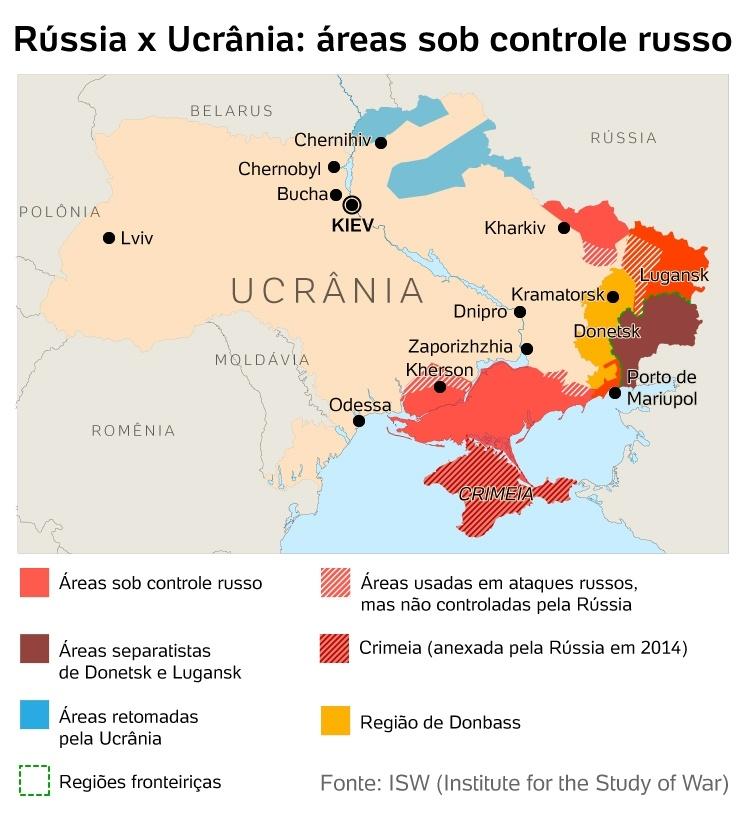Zaporizhzhia, Ukraine, May 4, 2022 (AFP) – Russia declared a unilateral daytime ceasefire from Thursday to facilitate the evacuation of civilians stranded at the Azovstal steelworks, the last hotbed of resistance in Mariupol, southeast Ukraine.
The Ministry of Defense announced that “from 8 am to 6 pm (Moscow time) on May 5, 6 and 7, a humanitarian corridor will be opened on the territory of the Azovstal metallurgical plant to evacuate civilians.”
During this period, the Russian Armed Forces and the Donetsk People’s Republic formations decided on a unilateral ceasefire against hostilities.
The decision was announced Wednesday night (4) after a day of intense Russian bombardment in various parts of Ukraine.

New sanctions against Russia
On February 24, more than two months after the start of the Russian invasion, the European Union (EU) announced that it was considering a sixth package of sanctions and an embargo on oil imports from Russia.
“We will gradually give up Russia’s supply of oil over a six-month period and the supply of oil products by the end of the year,” said Ursula von der Leyen, President of the European Commission.
According to EU officials, the Commission’s plan provides an exemption to Hungary and Slovakia, two landlocked countries that are entirely dependent on resources from the Druzhba pipeline and could continue to purchase from Russia in 2023.
However, Hungary rejected the European Commission’s (EU’s executive body) proposal “in its current form”, claiming that such a measure would “completely destroy the country’s energy security”.
This refusal was immediately condemned by Ukrainian Foreign Minister Dmytro Kuleba, who saw EU countries rejecting the embargo as “partners” in the “crimes” committed by the Russians in Ukraine.
Meanwhile, the UK has also announced a new package of sanctions, which includes a ban on providing accounting, consulting and communications services to Russia.
US President Joe Biden said he will discuss possible “additional” sanctions against Russia with the G7 countries this week.
The European Commission also proposed sanctions against the leader of the Russian Orthodox Church, Patriarch Kirill, for his preaching in support of military intervention in Ukraine.
bombings
In Ukraine, Russian forces continued to bombard the east and launched missiles at various targets throughout the country, including Lviv near the Polish border and the mountainous region of Transcarpathia near Hungary, which had not been hit so far. war.
“The enemy fired missiles at facilities in Dnipropetrovsk, Kirovohrad, Lviv, Vinnytsia, Kyiv, Transcarpathia, Odessa and Donetsk regions, with the aim of destroying Ukraine’s transport infrastructure,” the Ukrainian army said in a statement on Facebook.
In the east, Russia proposed “to ensure full control of the Donetsk and Luhansk regions and to protect a land corridor from the occupied Crimea”.
– Military parade in Mariupol? -Mayor Vadym Boichenko said “violent clashes” took place at Azovstal steelworks in Mariupol in the southeast.
Russia denied the bombings and assured that Russian forces would intervene only to “quickly interrupt efforts” to reach the “fire positions” of Ukrainian fighters.
According to Ukrainian intelligence, Russia plans to hold a military parade in Mariupol on May 9, when Moscow commemorates its 1945 victory over Nazi Germany.
Ukrainian President Volodymyr Zelensky said this week’s evacuation of 100 civilians from Azovstal with the help of the UN and the Red Cross showed that “international organizations can be effective” and urged UN Secretary-General António Guterres to do the rest. to save lives.
regional tensions
The President of the European Council, Charles Michel, announced in the Moldovan capital Chisinau that the EU will “significantly increase” military support to the country by “providing additional military equipment to its Armed Forces”.
This announcement comes days after the attacks on the territory of Transnistria, a pro-Russian separatist region that is part of Moldova, and comments made in April by Russian General Rustam Minnekaev that taking southern Ukraine would give the Russians direct access to that region.
Belarus, a border country with Ukraine and an ally of Russia, held “surprise” military exercises to test the reaction of its military.
On the diplomatic front, Russia has decided to boycott the UN Security Council meeting with the EU’s Political and Security Committee (PSC) on Wednesday.
Russia has also banned more than 60 Japanese government officials from accessing its territory, including Prime Minister Fumio Kishida, in retaliation for Japanese sanctions.
Former left-wing president of Brazil, Luiz Inacio Lula da Silva, said in an interview with Time magazine that Zelensky was “as responsible as Putin” for the war.
“I criticized Putin saying it was a mistake to invade while he was in Mexico City. But I don’t think anyone is trying to keep the peace. The public is promoting hatred against Putin. The presidential election in October.
Effect on interest rates
The war between Ukraine and Russia, the two major producers of raw materials and agricultural products, accelerated inflation worldwide and prompted central banks to raise interest rates.
The Federal Reserve (Fed, the US central bank) increased benchmark interest rates by half a point this Wednesday, the first increase of this magnitude since 2000, to try to control record inflation, underscoring “there will be” new highs. justify” in the future.
source: Noticias